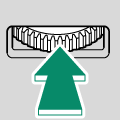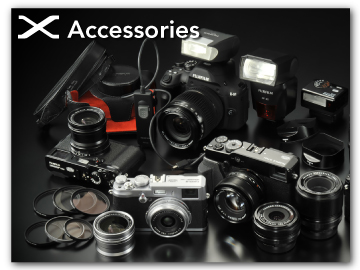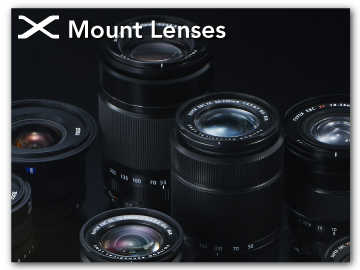Parts of the Camera
The parts of the camera are listed below.
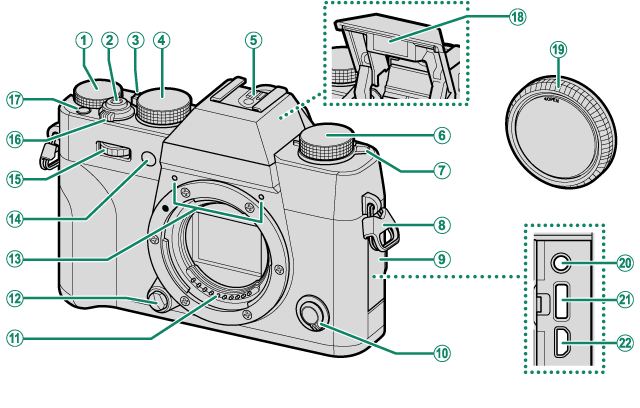
AExposure compensation dial
BShutter button
CAuto mode selector lever
DShutter speed dial
EHot shoe
FDrive dial
GN (flash pop-up) lever
HStrap clip
IConnector cover
JFocus mode selector
KLens signal contacts
LLens release button
MMicrophone
NAF-assist illuminator
Self-timer lamp
Tally light
OFront command dial
P[ON]/[OFF] switch
Q[Fn1] button
RFlash
SBody cap
TMicrophone/remote release connector
(Φ 2.5 mm)
UUSB connector (Type-C)
VHDMI Micro connector (Type D)
VUse an HDMI cable no more than 1.5 m (4.9 ft.) long.
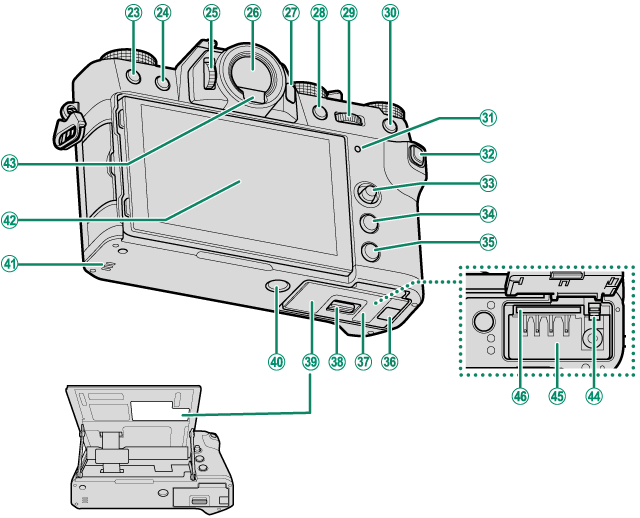
Wb (delete) button
Xa (playback) button
YDiopter adjustment control
ZElectronic viewfinder (EVF)
a[VIEW MODE] button
b[AE-L] (exposure lock) button
cRear command dial
d[AF-L] (focus lock) button
eIndicator lamp
Tally light
f[Q] (quick menu) button
gFocus stick (focus lever)
h[MENU/OK] button
i[DISP] (display)/[BACK] button
jCable channel cover for DC coupler
kBattery-chamber cover
lBattery-chamber cover latch
mSerial number plate
nTripod mount
oSpeaker
pLCD monitor
Touch screen
qEye sensor
rBattery latch
sBattery chamber
tMemory card slot
mDo not remove the serial number plate, which provides the CMIIT ID, serial number, and other important information.
- The Focus Stick (Focus Lever)
- The Shutter Speed Dial
- The Drive Dial
- The Exposure Compensation Dial
- The Auto Mode Selector Lever
- The Command Dials
- The Indicator Lamp
- The LCD Monitor
- Focusing the Viewfinder
The Focus Stick (Focus Lever)
Tilt or press the focus stick to select the focus area. The focus stick can also be used to navigate the menus.
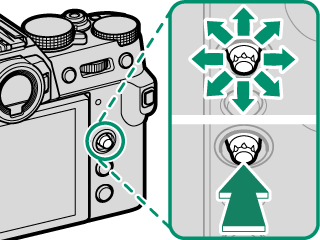
Use D[BUTTON/DIAL SETTING] > [FOCUS LEVER SETTING] to choose the role played by the focus stick (a[FOCUS LEVER SETTING]).
The Shutter Speed Dial
The shutter speed dial is used to choose the shutter speed.
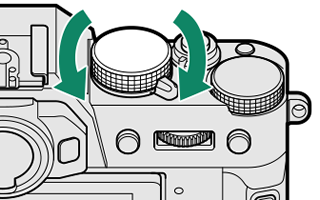
The Drive Dial
Rotate the dial to choose from the following the drive modes.
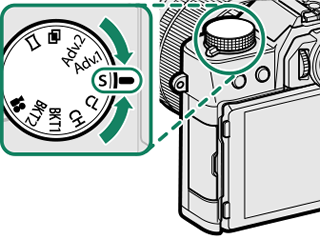
| Mode | |
|---|---|
| F | Movie (aRecording Movies) |
| [BKT1] [BKT2] |
Bracketing (aBracketing) |
| [CH] | High-speed burst (aContinuous Shooting (Burst Mode)) |
| [CL] | Low-speed burst (aContinuous Shooting (Burst Mode)) |
| [S] | Single frame (aTaking Photographs) |
| [Adv.1] [Adv.2] |
Advanced filter (aAdvanced Filters) |
| j | Multiple exposure (aMultiple Exposures ) |
| u | Panorama (aPanoramas) |
The Exposure Compensation Dial
Rotate the dial to choose an exposure compensation amount.
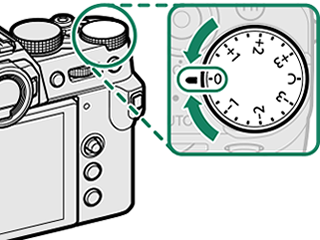
The Auto Mode Selector Lever
Switch between auto and manual modes.
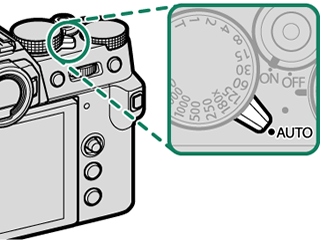
| Position | Mode |
|---|---|
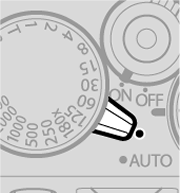 |
Select from [P] (program AE), [S] (shutter-priority AE), [A] (aperture-priority AE), and [M] (manual) modes (aMode [P]: Program AE, Mode [S]: Shutter-Priority AE, Mode [A]: Aperture-Priority AE), Mode [M]: Manual Exposure). Adjust shutter speed and aperture using program shift (mode [P]) or set shutter speed and/or aperture manually (modes [S], [A], and [M]). |
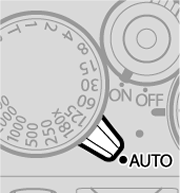 |
Auto mode. The camera adjusts settings automatically according to the option selected by rotating the front command dial. Choose from modes suited to specific subject types, or select [AUTO] to let the camera automatically match the mode to the subject (aAuto Mode). Scene selection is not available in drive modes [Adv.1], [Adv.2], j, and u. |
Restrictions may apply to camera settings depending on the mode and shooting conditions.
The Command Dials
Rotate or press the command dials to:
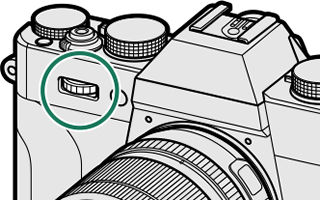
|
Rotate |
|
|---|---|
|
Press |
|
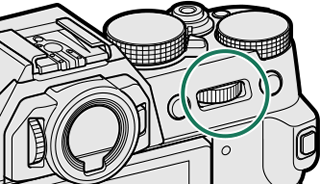
|
Rotate |
|
|---|---|
|
Press |
|
1 Aperture set to [A] (auto) and lens equipped with aperture ring or [COMMAND] selected for D [BUTTON/DIAL SETTING] > [APERTURE RING SETTING (A)].
2 Can be changed using D[BUTTON/DIAL SETTING] > [COMMAND DIAL SETTING].
3 Available only if [FOCUS CHECK] is assigned to a function button.
4 Exposure compensation dial rotated to [C].
5 Can be used to switch back and forth between aperture, sensitivity, and exposure compensation when exposure compensation dial is rotated to [C].
The Indicator Lamp
Camera status is shown by the indicator lamp.
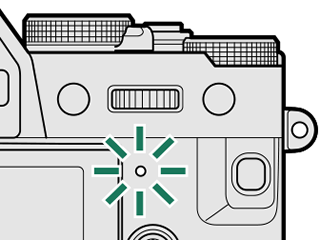
| Indicator lamp | Camera status |
|---|---|
| Glows green | Focus locked. |
| Blinks green | Focus or slow shutter speed warning. Pictures can be taken. |
| Blinks green and orange |
|
| Glows orange | Recording pictures. No additional pictures can be taken at this time. |
| Blinks orange | Flash charging; flash will not fire when picture is taken. |
| Blinks red | Lens or memory error. |
* Displayed only if pictures are selected for upload.
Warnings may also appear in the display.
The indicator lamp remains off while your eye is to the viewfinder.
The B[MOVIE SETTING] > [TALLY LIGHT] option can be used to choose the lamp (indicator or AF-assist) that lights during movie recording and whether the lamp blinks or remains steady.
The LCD Monitor
The LCD monitor can be tilted for easier viewing, but be careful not to touch the wires or trap fingers or other objects behind the monitor. Touching the wires could cause camera malfunction.
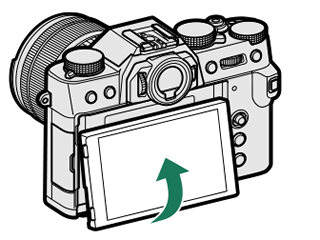
The LCD monitor also functions as a touch screen that can be used for:
Focusing the Viewfinder
If the indicators displayed in the viewfinder are blurred, put your eye to the viewfinder and rotate the diopter adjustment control until the display is in sharp focus.
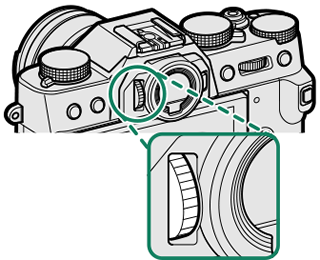

 .
.
